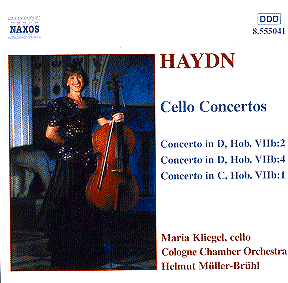Naxos discs not only offer remarkable value for money
but are also invariably accompanied by a richly informative booklet
(especially when, as on this occasion, Keith Anderson’s familiar hand
is at work). Here, the long-disputed question of the authenticity of
cello concertos attributed to Haydn is addressed with convincing authority.
That Haydn did compose the first of the above-named D major concertos
was firmly established in 1953. The earlier C major concerto, long thought
to have been lost, came to light in 1961, and now has an equally assured
place in the repertoire.
Doubts still remain about the other D major concerto,
principally because one of the four surviving original scores is attributed
to someone else and also because of its allegedly uncharacteristic weaknesses.
One of these – conventional sequential patterns – is particularly noticeable
in the finale, but does it really matter who wrote the work? For, if
not by Haydn, it’s certainly Haydnesque and it contains a slow movement
of heart-warming beauty.
Maria Kliegel delivers wonderful performances of both
this and the two ‘established’ concertos, notable especially for warmth
of tone and impeccable style. Most of all I savoured the tantalising
rubato which she brings to the cadenzas (but were they Haydn’s
originals – I think we should have been told). She also clearly enjoys
exceptional rapport with Müller-Brühl and the much-acclaimed
Cologne Chamber Orchestra, which is in sparkling form throughout. The
recording quality is no less exceptional: natural sound, perfect balance.
In short, this disc is an absolute winner.
Adrian Smith

![]() Cologne Chamber Orchestra
/ Helmut Müller-Brühl with Maria Kliegel (cello)
Cologne Chamber Orchestra
/ Helmut Müller-Brühl with Maria Kliegel (cello) ![]() NAXOS 8.555041 [75:27]
NAXOS 8.555041 [75:27]